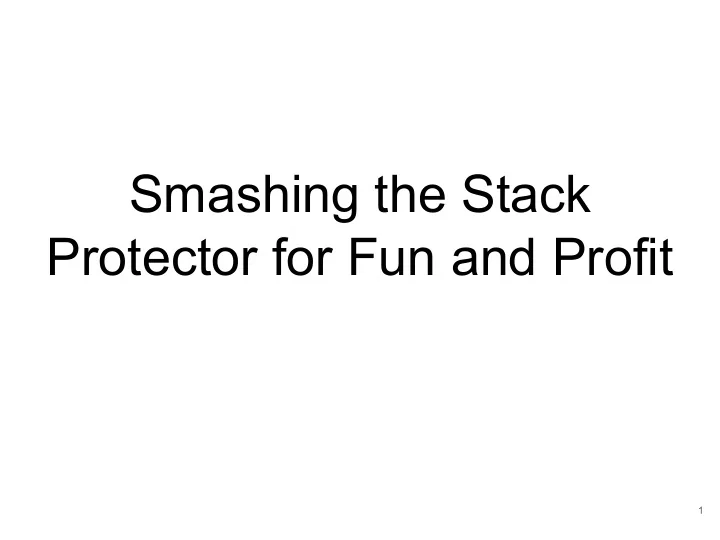

Smashing the Stack Protector for Fun and Profit 1
1996: Smashing The Stack for Fun and Profit ... overflow direction / higher addresses int main(int argc, char **argv) buf { stack growth char buf[0x10]; gets(buf); saved return address return 0; argc } argv ... 2
1998: StackGuard ... Function Prologue: Place canary on stack overflow direction / higher addresses int main(int argc, char **argv) buf { stack growth char buf[0x10]; gets(buf); stack canary return 0; saved return address } argc argv Function Epilogue: Check canary integrity ... 3
Our Work: (Systematic) Evaluation of Implementations ● Integrity check is implemented as a comparison with some reference value ● Central question: Where is the reference value stored? 4
Background: Memory Types ● Stack based variable - local variable int a(void) { char loc[0x10]; ● Thread Local Storage - storage specific to one thread char __thread tls[0x10]; ● Static - global variable static char sta[0x10]; Dynamic - allocated with malloc ● char *dyn = malloc(0x10); 5
Code / Static Data Sample Address ... Space Layout heap ... tls ● Measurement: ... ○ Distances reference canary ○ Gaps / ... Permissions stack ● Classification: ... ○ OK ✓ ○ Weak ✗ (kernel) ○ Vulnerable ✗ 6
Code / Static Data Code / Static Data Code / Static Data ... ... ... heap tls heap ... ... ... tls stack heap (Guard page) ---p reference canary reference canary reference canary ... (Guard page) ---p (Guard page) ---p stack stack tls ... ... ... (kernel) (kernel) (kernel) OK Weak Vulnerable ✓ ✗ ✗ 7
8
Conclusion: libcs with Thread Local Storage & Threading Are completely broken! 9
=========================================================================== ASIACCS’17 Review #386A --------------------------------------------------------------------------- Paper #386: CookieCrumbl0r: Smashing the Stack Protector for Fun and Profit --------------------------------------------------------------------------- Overall merit: 2. Weak reject Reviewer expertise: 4. Expert (...) ===== Weaknesses of paper ===== With the rise of CFI mechanisms that will protect the backward edge through some form of stack integrity, defenses that rely on stack cookies are on their way out, therefore this paper has low novelty and impact. ⇒ Fallacy! 10
Why we need stack canaries, even with CFI: int auth(char * valid) { char password[32]; gets(password); return strcmp(valid, crypt(password, valid)) == 0; } void main(void) { char admin_hash[] = "$6$..."; // long hash value if (auth(admin_hash)) { puts("Welcome to the Admin Area"); } } 11
SafeStack: Canaries: SafeStack + Canaries: 12
Conclusion: Stack Canaries are still a strong protection mechanism and should be used together with newer techniques like CFI. 13
Recommend
More recommend